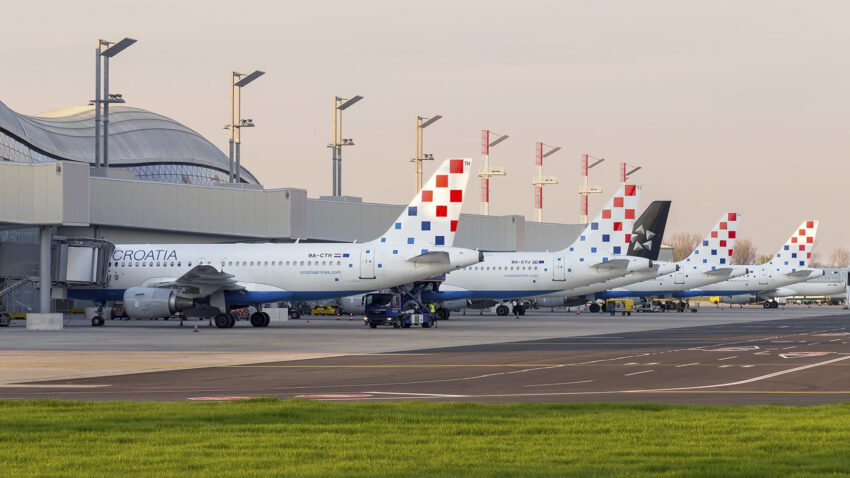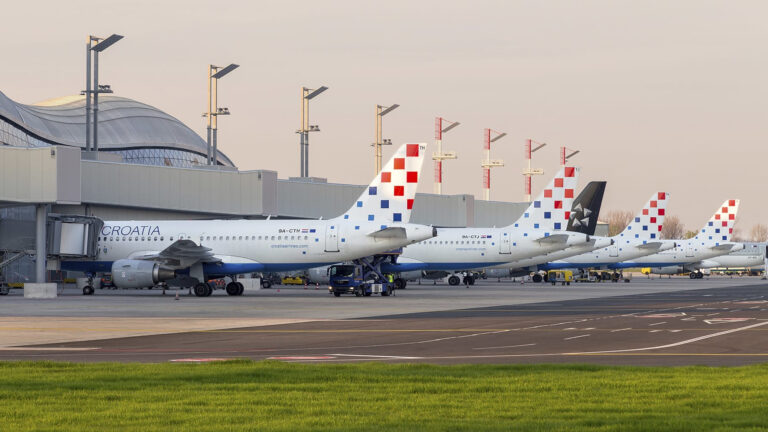Friday July 5, 2024
Reading time: 3 minutes

Croatia Airlines is set to undergo a significant expansion, marked by the arrival of its first Airbus A220-300 as part of a fleet replenishment initiative launched this month. This strategic initiative is expected to diversify the airline’s route offering, with a particular focus on destinations in southern Croatia to primarily cater to leisure travellers. The expansion aims to mitigate the seasonal nature of its operations, by offering a more consistent service throughout the year. The airline’s CEO Jasmin Bajić highlighted the potential for new business opportunities with the gradual addition of fifteen A220 aircraft to the fleet by the end of 2027, which will facilitate the launch of new routes and increase frequencies on existing routes. This fleet replenishment is not only a fleet modernization effort, but also a strategic expansion into untapped markets.
Using the Zagreb Airport Incentive Model
To support this network expansion, Croatia Airlines can rely on the Connecting Capital Cities incentive model of Zagreb Airport. This model incentivizes airlines to launch at least two weekly flights throughout the year to at least three of the sixteen pre-selected destinations. Destinations eligible for this incentive program include major European cities such as Prague, Tallinn, Berlin, Budapest, Riga, Vilnius, Luxembourg and Stockholm, as well as other important hubs such as Tirana, Pristina, Reykjavik, Tbilisi, Kyiv (after the reopening of Ukrainian airspace), Chisinau and Yerevan. This year, the airline has already launched new operations from Zagreb to Stockholm, Berlin and Tirana, in line with the objectives of the incentive model.
Competitive landscape and opportunities
Over the last two years, Ryanair has successfully launched new leisure-focused routes from Zagreb, operating them all year round. By targeting the busiest destinations not served from the Croatian capital, Ryanair has significantly reduced the number of underserved routes that Croatia Airlines could have otherwise operated, particularly to southern European destinations. However, there are still considerable opportunities, particularly in European cities based on indirect traffic flow. Destinations with high demand but not served from Zagreb include Lisbon, Geneva, Porto, Riga, Vilnius, Tallinn, Bologna, Krakow, Hannover, Nice, Bilbao and Luxembourg. In addition, regional routes to Budapest and Pristina, as well as Cairo in North Africa, offer further expansion opportunities.
Consequences for the airline industry
The introduction of new routes by Croatia Airlines and the potential use of incentives at Zagreb Airport are expected to impact the airline industry by improving connectivity and reducing seasonal fluctuations in travel. This initiative is part of broader trends in the aviation sector, where airlines are increasingly looking to diversify their route networks and reduce their reliance on seasonal peaks. For the global travel industry, this development means better connectivity to and from Croatia, making it a more accessible destination for international travellers.

Global effects on travelers
For travellers, the expansion of Croatia Airlines’ network offers many benefits. Better connectivity means more direct flights to various European and Mediterranean destinations, reducing the need for stopovers and making travel more convenient. Leisure travellers, in particular, will have more opportunities to travel year-round to Croatia, encouraging tourism even outside of traditional peak seasons. The expansion also offers greater opportunities for cultural exchange and economic ties between Croatia and other countries, further integrating the country into the global travel network.
Future prospects
In summary, Croatia Airlines’ fleet renewal with Airbus A220-300 aircraft marks an important milestone in the airline’s strategic expansion. By targeting new routes and leveraging Zagreb Airport’s incentives, the airline is set to strengthen its market presence and provide better connectivity to travelers. This development is set to benefit both the airline industry and travelers around the world, promoting year-round travel and reducing seasonality. With the fleet renewal completed by the end of 2027, Croatia Airlines will likely emerge as a stronger competitor in the European aviation market, offering expanded services and enhanced travel experiences.



